

“The defects of the mind are like the wounds of the body. Whatever care we take to heal them, the scars ever remain, and there is always danger of their reopening.” ~François de la Rochefoucauld at Wellness Words of Wisdom. June 2nd, 2011 A scratch from a cat or a thorn will eventually disappear leaving no scar unless, over time, it is repeatedly reopened as in pulling weeds from inside a pricker bush, daily.
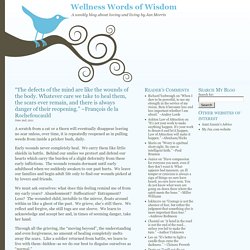
Early wounds never completely heal. We carry them like little shields in battle. Behind our smiles we protect and defend our hearts which carry the burden of a slight deformity from these early inflictions. The wounds remain dormant until early adulthood when we suddenly awaken to our past hurts. We must ask ourselves: what does this feeling remind me of from my early years? Through all the grieving, the “moving beyond”, the understanding and even forgiveness, no amount of healing completely melts away the scars.
Is this the world's happiest man? Brain scans reveal French monk found to have 'abnormally large capacity' for joy, and it could be down to meditation. Brain scans reveal Buddhist monk Matthieu Ricard has largest capacity for happiness ever recordedMeditation 'completely changes your brain and therefore changes what you are', says 66-year-oldHe says you can do it too by learning how to let your thoughts drift By Claire Bates Published: 10:41 GMT, 31 October 2012 | Updated: 14:32 GMT, 31 October 2012 Ricard: 'Meditation is not just blissing out under a mango tree but it completely changes your brain' A French genetic scientist may seem like an unusual person to hold the title - but Matthieu Ricard is the world's happiest man, according to researchers.

The 66-year-old turned his back on Parisian intellectual life 40 years ago and moved to India to study Buddhism. Now it seems daily meditation has had other benefits - enhancing Mr Ricard's capacity for joy. Goodwill Meditation Group. For many years a growing group of people in many parts of the world has been linking in thought each week and joining in a meditation on goodwill.
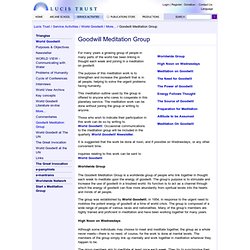
The purpose of this meditation work is to strengthen and increase the goodwill that is in all people, helping to solve the urgent problems facing humanity. This meditation outline used by the group is offered to anyone who cares to cooperate in this planetary service. The meditation work can be done without joining the group or writing to anyone. Those who wish to indicate their participation in this work can do so by writing to World Goodwill.
Occasional communications to the meditation group will be included in the quarterly World Goodwill Newsletter. Stoicism / Getting Stronger. Hormetism is a practical set of tools that can help you lose weight, get fit, or even improve your eyesight.
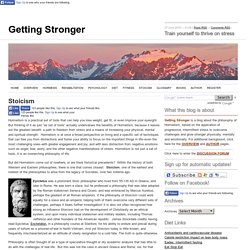
But thinking of it as just “as set of tools” actually undervalues the benefits of Hormetism, because it leaves out the greatest benefit: a path to freedom from stress and a means of increasing your physical, mental and spiritual strength. Stoicism / Getting Stronger. AuditoryDrivingRitualTech.pdf. Human Needs: The Human Givens Approach To Physical & Emotional Needs. The principles behind the human givens approach grew out of the work of a group of psychologists and psychotherapists who were trying to bring greater clarity to the way people who become depressed, anxious, traumatised or addicted are helped, as well as making such help more reliably effective (read more).
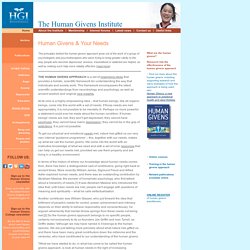
THE HUMAN GIVENS APPROACH is a set of organising ideas that provides a holistic, scientific framework for understanding the way that individuals and society work. This framework encompasses the latest scientific understandings from neurobiology and psychology, as well as ancient wisdom and original new insights. Reversal Theory Society. Reversal theory provides an analysis of the experience of everyday life, showing that a normal person will display different personalities at different times, meaning that he or she will see the world, and act in it, in different ways at different moments.
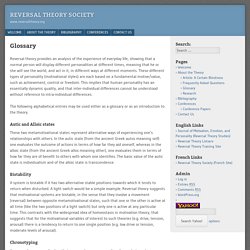
These different types of personality (motivational styles) are each based on a fundamental motive/value, such as achievement, control or freedom. This implies that human personality has an essentially dynamic quality, and that inter-individual differences cannot be understood without reference to intra-individual differences. The following alphabetical entries may be used either as a glossary or as an introduction to the theory.
Autic and Alloic states These two metamotivational states represent alternative ways of experiencing one’s relationships with others. Brainwave Meditation MP3s for Lucid Dreaming. Meditation is an excellent primer for having lucid dreams, as studies have shown and as I can personally attest.
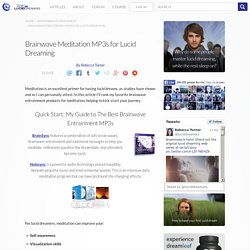
In this article I'll rank my favorite brainwave entrainment products for meditation, helping to kick-start your journey. Quick Start: My Guide to The Best Brainwave Entrainment MP3s. Eco Culture. AE. Spirits Align. Spiritual Succor. Positive Psychology Center Online Research Program - University of Pennsylvania. TECH Home, focusing on body-mind dynamics. Autopoesis_and_cognition.pdf. Flow and Adolescence. The flow experience is a state of complete involvement in an activity that requires complete concentration (Csikszentmihalyi, 1999).
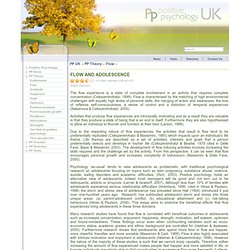
Flow is characterised by the matching of high environmental challenges with equally high levels of personal skills, the merging of action and awareness, the loss of reflexive self-consciousness, a sense of control and a distortion of temporal experiences (Nakamura & Csikszentmihalyi, 2005). Activities that produce flow experiences are intrinsically motivating and as a result they are valuable in that they produce a state of being that is an end to itself. Furthermore they are also hypothesised to allow an individual to flourish and function at their best (Larson, 1988). Due to the rewarding nature of flow experiences, the activities that result in flow tend to be preferentially replicated (Csikszentmihalyi & Massimini, 1985) which impacts upon an individual’s life theme.
References and Further Reading Adlai-Gail, W.S. (1994). Carr, A. (2007). Shernoff, D. Flow (psychology) Concentrating on a task is one aspect of flow.
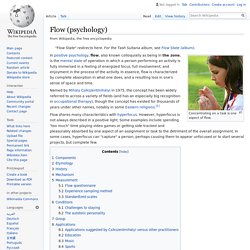
In positive psychology, flow, also known colloquially as being in the zone, is the mental state of operation in which a person performing an activity is fully immersed in a feeling of energized focus, full involvement, and enjoyment in the process of the activity. In essence, flow is characterized by complete absorption in what one does, and a resulting loss in one's sense of space and time. Flow shares many characteristics with hyperfocus. Kairos @ Laetus-in-Praesens.org. Distinguishing Emergent Conceptual Polarities: experimental ordering of a collection of research papers.